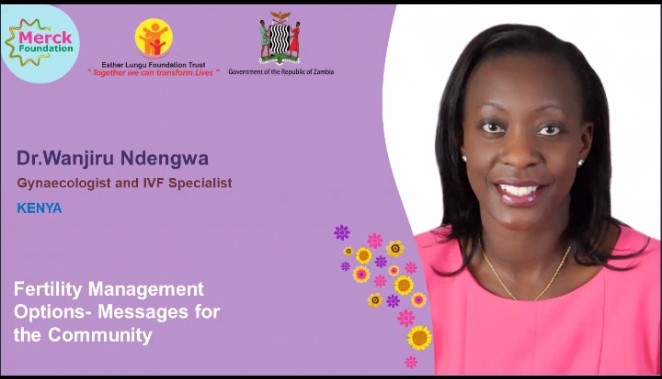April 29, 2021
By Boris Esono Nwenfor

The issue of fertility and infertility is seen as a problem for the couple as a whole and not of a particular sex. Dr Wanjiru Ndengwa, IVF Specialist and Gynecologist said.
Dr Ndengwa-Njuguna was speaking on Fertility Management Options – Messages for the Community during the Merck Foundation Community Awareness Program: Health Media Training 2021 held virtually on April 29, 2021.
The training is part of the 2021 Merck Foundation Africa – Asia Luminary Virtual Conference aimed at breaking the stigma around infertility in general and infertile women in specific and to support girl education as Ambassadors of the “Merck Foundation More Than a Mother” campaign
“The issue of infertility is not just on one side but affects both sexes. We have to remove the stigma and it is quite unfortunate that women are the ones bearing the problem; with it now looked at as a women’s thing,” Dr Ndengwa-Njuguna, IVF Specialist, Footsteps to Fertility Centre, Kenya said.
In Africa, there are so many consequences that are associated with an infertile woman. The families often scold the lady; stigmatized her and she is often replaced by another lady. There is a constant pressure that is being exerted on the lady to have a birth.
Dr Ndengwa-Njuguna said: “Women are the ones being called barren, sterile whereas the men are not looked at in that way and some of them may be the cause of the women being infertile. We have to reduce the stigma so that violence can end; emotional abuse and women must understand that they are more than a mother.”
Speaking on why women are stigmatized, Dr Ndengwa said it is down to poor knowledge of fertility and infertility issues plus financial problems. She added that there are big difficulties for me to consult; the low purchasing power of women who consult; unfavourable health pyramid; and poor management of infertility problems.

Responding to the question on the need for surrogacy, she said that surrogacy needs to be allowed. “Many women have problems which have led to them not being able to give birth. I understand that it can be misused for financial gains but there are genuine cases in which I think surrogacy can be allowed.”
According to Dr Ndengwa, there are several ways that media men and women and those across the board can fight this stigma on women. She noted education at all level as one of the important factors in breaking this stigma barrier. Other factors include the involvement of the Civil society; the determining role of public authorities; the major role of the media; integration of women and girls and training for adults and young people.
